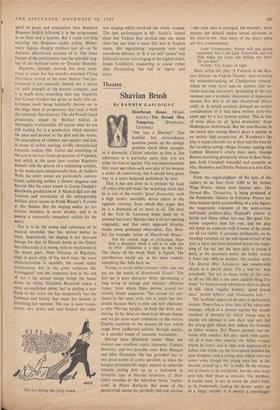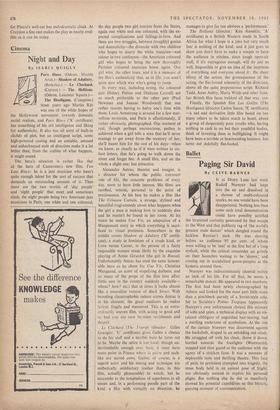Theatre
Shavian Brush
By BAMBER GASCOIGNE Heartbreak House. (Wynd- ham's.)—The Second Mrs.
Tanqueray. (Pembroke, Croydon.) 'ARE you a Shavian?' This familiar but extraordinary question points up the strange position which Shaw occupies as a dramatist. Critical reaction to him is like adherence to a particular party line; you are either for him or against. This was understandable fifty years ago when each new play of his became a centre of controversy, but it should have given way to a more balanced assessment by now.
That it has not done so is perhaps the fault of critics who still make the surprising claim that he is one of the world's 'great' dramatists; such a high verdict inevitably drives others to the opposite extreme, from which they argue that he is a dramatist of no merit at all. The stars of the Ayot St. Lawrence home team try to pretend that every Shavian idea is of eye-opening originality, and that every apparent, frivolity cloaks some profound observation. Eric Bent- ley, for example, writes of Heartbreak House:
For the current stage of civilisation, Shaw finds a metaphor which is still to be with him in 1933: civilisation is a ship on the rocks. The choice of the word 'finds' is typical. The non-Shavian would use, in the same context, something like 'falls back_on.'
Trying to avoid either extreme, what can one say are the merits of Heartbreak House? The first act is pure character farce, introducing a long string of strange and mutually offensive 'types,' from whom Shaw derives several ex- tremely funny sequences. The second act con- tinues in the same style, but is much less suc- cessful because there is only one new character, a very Shavian burglar, to keep the brew sim- mering. In the third act there is an abrupt change and we get some acute comments on the various English reactions to the disaster of war, which range from ineffectual activity, through apathy, to a suicidal brand of romantic excitement.
During these disjointed events Shaw has created one excellent comic character, Captain Shotover, and two passable ones, Boss Mangan and Mrs. Hushabye. He has provided one or two good scenes of comic paradox, as when the burglar persuades his angry captors to subscribe towards setting him up as a locksmith (a favourite type of Shavian inversion; cf. Doo- little's troubles or the Salvation Army 'confes- sions' in Major Barbara). But some of the paradoxical scenes are painfully old and obvious —the man who is outraged, for example, when anyone but himself makes sexual advances to his sister-in-law. And many of the play's jokes are very commonplace.
LADY UTTERWORD : Nurse; will you please remember that I am Lady Utterword, and not Miss Addy, nor lovey, nor darling, nor doty? Do you hear?
NURSE: Yes, ducky; all right.
Shaw called this play 'A Fantasia in the Rus- sian Manner on English Themes,' thus revealing his misunderstanding of Chekhovian comedy, which he must have seen as aimless chat be- tween amusing characters, developing at the last moment into a symbolic discussion of important themes. For this is all that Heartbreak House really is. It would certainly demand no serious consideration if it had been written forty-five years ago by a less famous author. This is true of some plays by all 'great dramatists,' from Shakespeare downwards. But the non-Shavian in me insists that among Shaw's plays it applies to an unduly high proportion. At Wyndham's the play is made tolerable for at least half the time by the' excellent acting—Roger Livesey rasping out Captain Shotover's crusty bons mots, George Benson bumbling pompously about as Boss Man- gan, Judy Campbell beautiful and eccentric as Mrs. Hushabye and Perlita Neilson as a trim Ellie Dunn.
From the rogue-elephant of the turn of the century to its lion—from GBS to Sir Arthur Wing Pinero, whose most famous play, The Second Mrs. Tanqueray, is being produced at the Pembroke Theatre in Croydon. Pinero has been handed down as something of a joke figure; the respectable exponent of the semi-serious well-made problem-play, England's answer to Scribe and Ibsen rolled into one. But good Vic- torian carpentry lasts for ever, and the play still holds an audience even if some of the joints are all too visible. It contains, incidentally, an in- teresting variation on the well-timed arrival of the post; a letter has been delivered before the begin- ning of the act, but the hero fails to notice it until, at the necessary point, the butler moves it from one table to another. On another level, The Second Mrs. Tanqueray has considerable charm as a period piece. 'I'm a bad lot,' says somebody, 'but not in mean tricks of this sort. In all my life this is the most caddish thing I've done.' To balance such admissions there is plenty of talk about 'regular women,' good honest men,' decent fellows' and 'wholesome folk.'
The 'problem' aspect of the play is particularly bizarre. Pinery has a clear idea of his admirable message, which is a protest against the double standard of morality by which young men in society are allowed to sow their wild oats but the young girls whom they seduce are branded as fallen women. But Pinero answers one ex- treme with another. His play starts with appro- val of a man who marries the fallen woman whom he loves; and it ends with approval of a father who breaks up the love-match between his pure daughter and a young man. whose oats are sown—even though the young man has, in the interim, picked up a VC in India. So the women are in future to be acceptable, but the men must now take their place as outcasts. The problem, it would seem, is not so much the play's topic as its framework, leading the drama neatly up to a tragic suicide; it is merely a coat-hanger for Pinero's well-cut but melodramatic cloak. At Croydon a fine cast makes the play as nearly cred- ible as it can be today.











































 Previous page
Previous page